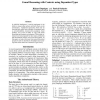Free Online Productivity Tools
i2Speak
i2Symbol
i2OCR
iTex2Img
iWeb2Print
iWeb2Shot
i2Type
iPdf2Split
iPdf2Merge
i2Bopomofo
i2Arabic
i2Style
i2Image
i2PDF
iLatex2Rtf
Sci2ools
105
click to vote
FLAIRS
2008
2008
Causal Reasoning with Contexts Using Dependent Types
In Artificial Intelligence, a crucial requirement is the ability to reason about actions and their effects on the environment. Traditional approaches which rely on classical logic suffer from a number of limitations such as semi-decidability, closed-world assumption, frame problem, and a lack of ability to cope with partial knowledge and dynamic environments. While many solutions have been proposed for these topics, difficulties and uncertainties remain, even in the latest papers. In this paper, we look at this issue from a proof-theoretical perspective and we describe the foundations for reasoning about action based on Constructive Type Theory.
Related Content
| Added | 02 Oct 2010 |
| Updated | 02 Oct 2010 |
| Type | Conference |
| Year | 2008 |
| Where | FLAIRS |
| Authors | Richard Dapoigny, Patrick Barlatier |
Comments (0)

